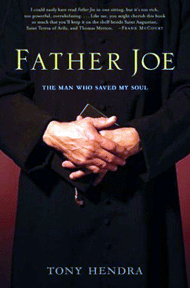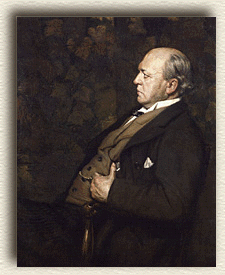

From the time we are little knock-abouts we all know the charm of a story well-told. This month we celebrate three tellers of tales who have mastered the art of seductive word-weaving.

 When I was a little knock-about myself, I dearly wanted one of those new dolls with eyes that
moved and skin that felt real to the touch. In the Eastern European atmosphere of my constricted
family, however, touching required celestial intervention, and "want" was a four-letter word. You could need, but never want. At four how do you
explain a need? It took a long time for that doll to be acquired, but I managed, at five, to get
my revenge: I volunteered my precious doll for a role as the baby Jesus lying in a manger at the school pageant.
If the Christian baby was so adored, my baby was no less so. I was ecstatic; my Jewish/Russian grandmother apoplectic. Eventually, I left
the rituals and constrictions behind and treasured my wants, and right now I want a "Father Joe".
As described by Tony Hendra in his elegant and graceful memoir, Father Joe is a friend, companion
and mentor; he is a source of endless nourishment and support; a firm but loving font of
affirmation. Just published by Random House, "Father Joe" received a well-deserved accolade
from the New York Times. I think I may read it several times.
When I was a little knock-about myself, I dearly wanted one of those new dolls with eyes that
moved and skin that felt real to the touch. In the Eastern European atmosphere of my constricted
family, however, touching required celestial intervention, and "want" was a four-letter word. You could need, but never want. At four how do you
explain a need? It took a long time for that doll to be acquired, but I managed, at five, to get
my revenge: I volunteered my precious doll for a role as the baby Jesus lying in a manger at the school pageant.
If the Christian baby was so adored, my baby was no less so. I was ecstatic; my Jewish/Russian grandmother apoplectic. Eventually, I left
the rituals and constrictions behind and treasured my wants, and right now I want a "Father Joe".
As described by Tony Hendra in his elegant and graceful memoir, Father Joe is a friend, companion
and mentor; he is a source of endless nourishment and support; a firm but loving font of
affirmation. Just published by Random House, "Father Joe" received a well-deserved accolade
from the New York Times. I think I may read it several times.


"The Master", by Colm Toibin, is a different kind of gift to the heart. Toibin takes us into the soul of Henry James, as we move with James through the literary societies of London, Venice, Rome, and Newport. We listen to his conversations and ruminations about Oliver Wendell Holmes and Oscar Wilde. We follow the creative process, and feel the mood swings of the writer as he transforms the minutiae of daily life into great literature. We feel the chill that prevents others from invading his personal space as he simultaneously invades and recreates the elaborately cloaked feelings of those around him. I was so moved by Toibin's writing that I have ordered biographies of Wilde and Holmes to better immerse myself in that period. I only hope that these tales-to-be-read can reach the high bar that "The Master" has set. (Scribner, 2004.)

Finally, despairing because nine out of ten books of poetry sold in England last year were by dead poets, the Arts Council of Britain and the Poetry Book Society have paid tribute to the twenty most talented young poets in the United Kingdom. We quote one poem here called "The Sting", by Patience Agbabi,winner of the 1995 Excelle Literary Award. Her poetry is available in "Transformatrix", Canongate, Payback Press:
At twelve I learnt about The Fall,
had rough-cut daydreams based on original sin,
nightmares about the swarm of thin-
lipped, foul-mouthed, crab apple-
masticating girls who'd chase me full
throttle: me, slipping on wet leaves, a heroine
in a black-and-white cliche; them, buzzing on nicotine
and the sap of French kisses. I hated big school
but even more, I hated the lurid shame
of surrender, the yellow miniskirt
my mother wore the day that that man
drove my dad's car to collect me. She called my name
softly, more seductive than an advert.
I heard the drone of the engine, turned and ran."

To our viewers, happy wanting, and thinking, and reading!
c.Corinne Whitaker 2004